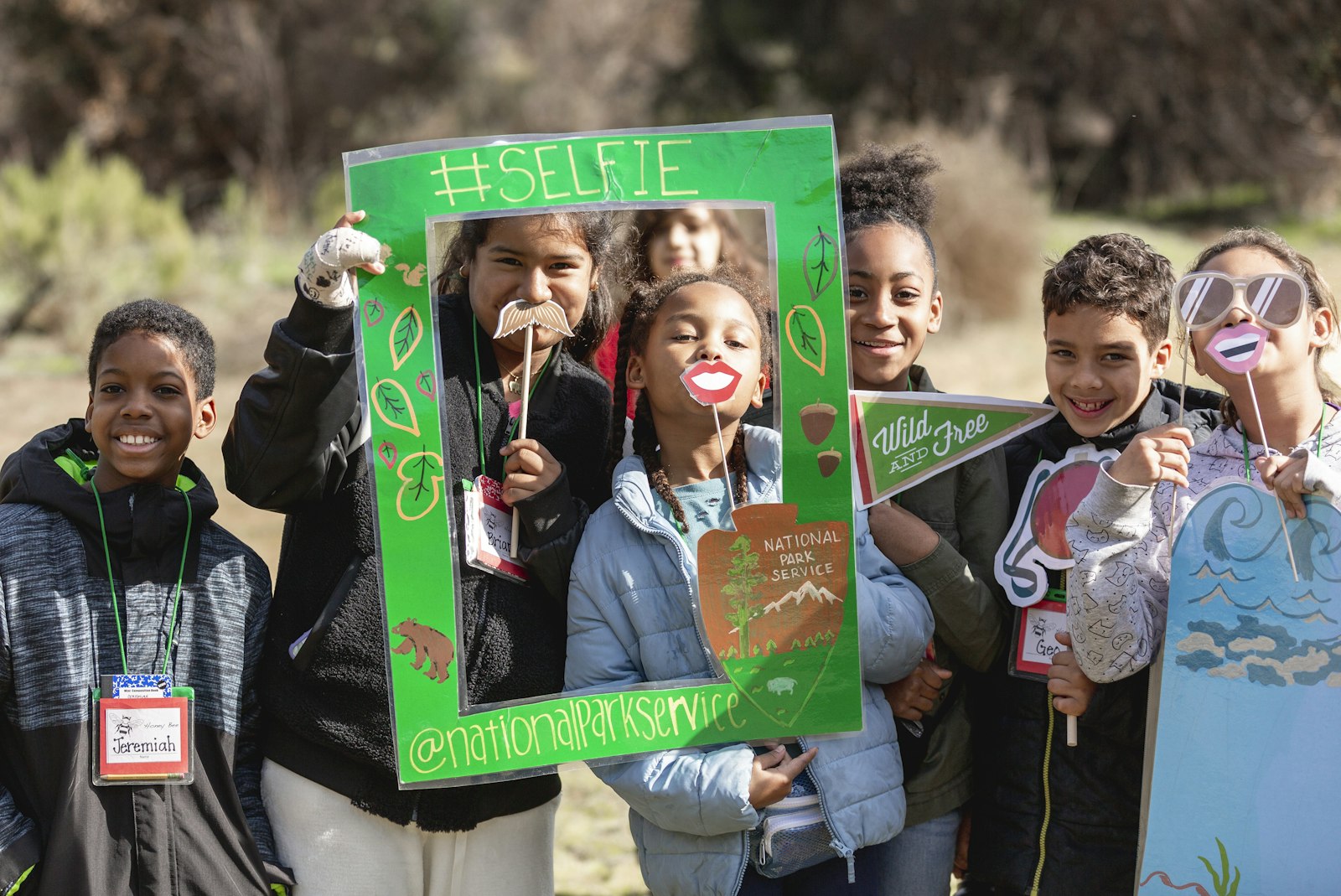
.
.
National Park Foundation Invests $4.4 Million in Connecting Students to National Parks Across the Country
Washington, D.C. — The National Park Foundation (NPF) is excited to announce that 99 Open OutDoors for Kids grantees will receive a combined $4.4 million dollars in funding during the 2023-2024 school year.
Building on a child’s innate wonder and curiosity of the natural world, Open OutDoors for Kids grants allow students to immerse themselves in national parks through field trips, classroom engagements, and educational activities. The program’s goal is to deepen connections to our natural and cultural world, creating lifelong national park stewards.
“We are beyond thrilled to reach over 2 million students through our Open OutDoors for Kids program,” said Lise Aangeenbrug, chief program officer at the National Park Foundation. “I believe that it’s never too early to build a connection with our natural world and learn about our country’s history through unique, hands-on experiences in national parks. We look forward to reaching millions of more students over the coming years through high-quality, engaging education programs that span topics as diverse as the more than 400 national park sites.”
This year’s investment reaches an all-time high in funding impact and contributes to the celebratory milestone of the Foundation connecting more than 2 million students to national parks since Open OutDoors for Kids’ inception in 2011.
“America’s 425 national parks provide incredible opportunities for growth and meaningful connection with the country’s cultural heritage,” said National Parks Service Director Chuck Sams. “Children from Massachusetts to California and in between will continue to benefit from this investment, allowing students to experience unparalleled places of learning like Everglades National Park, Sleeping Bear Dunes National Lakeshore, and Bronzeville-Black Metropolis National Heritage Area.”
Here are a few examples of the programs and projects that OOK will support this year:
- Saugus Iron Works and Salem Maritime National Historical Site (Massachusetts) – Park staff, classroom teachers, and Indigenous educators have worked to create a curriculum that engages students in the intertwined history between colonialism and the lived experiences of Indigenous people. Using traditional knowledge along with natural and cultural resources within the park, educators will help students to interpret their region’s history.
- Sleeping Bear Dunes National Lakeshore (Michigan) – Students will learn about the cultural importance of the night sky throughout time. With special focus on the Anishinaabe, the local Native Americans of the region, students will engage their senses to experience the visual, tactile, and auditory experiences that connect cultures with the stars, with accommodations for students with learning disabilities as well as those who may have hearing or visual impairments.
- Bronzeville-Black Metropolis National Heritage Area (Illinois) — Students will visit the Pullman National Historical Park and the A. Philip Randolph Pullman Porter Museum, to learn about the history of the Pullman community and the significance of the Pullman Porters in the Great Migration and to the labor movement in the United States. Through engagements with the park and museum staff onsite, monthly virtual presentations, and opportunities for research and collaboration with their peers, students will investigate the cultural significance of their community considering architecture and housing, occupations and opportunities, and successes and challenges while making connections with their own lives.
- Point Reyes National Seashore (California) – San Francisco Bay Area fourth graders will embrace the great outdoors at Point Reyes National Seashore by visiting the native northern elephant seals and gray whales. Marine biologists, park rangers, and wildlife educators will provide students with the tools to engage in personal reflection on the magnificent migrations of the animals. Lessons will contain information from local indigenous groups and will be available in both English and Spanish.
- Everglades National Park (Florida) – Over 15,000 students in the Miami area will take their first step towards becoming lifelong national park stewards by visiting Everglades and Biscayne National Parks to learn about the region’s rich biodiversity. Lessons on these sites will be shared with students both hands-on and virtually with the purpose of engaging student’s families and the larger community.
“At Union Pacific, we believe everyone deserves the opportunity to experience the magic of our national parks. That’s why we’re proud to support the National Park Foundation’s Open OutDoors for Kids program, which helps connect students with these incredible places,” said Liisa Stark, Union Pacific vice president-Public Affairs. “These experiences spark a sense of wonder and appreciation for our natural and cultural heritage, and they inspire the next generation of park stewards.”
The National Park Foundation would like to acknowledge and thank the following partners for supporting our mission to protect and enhance America's national parks for present and future generations: Columbia, Alicia and Peter Pond, Columbia Sportswear, Sierra, Humana, General Motors, Maverik, Expedia, Union Pacific, Chick-fil-A, Inc., and The Batchelor Foundation, Inc.
View the full list of NPF Open OutDoors for Kids grantee projects for the 2023-2024 school year.
About the National Park Foundation
The National Park Foundation works to protect wildlife and park lands, preserve history and culture, educate, and engage youth, and connect people everywhere to the wonder of parks. We do it in collaboration with the National Park Service, the park partner community, and with the generous support of donors, without whom our work would not be possible. Learn more at nationalparks.org.